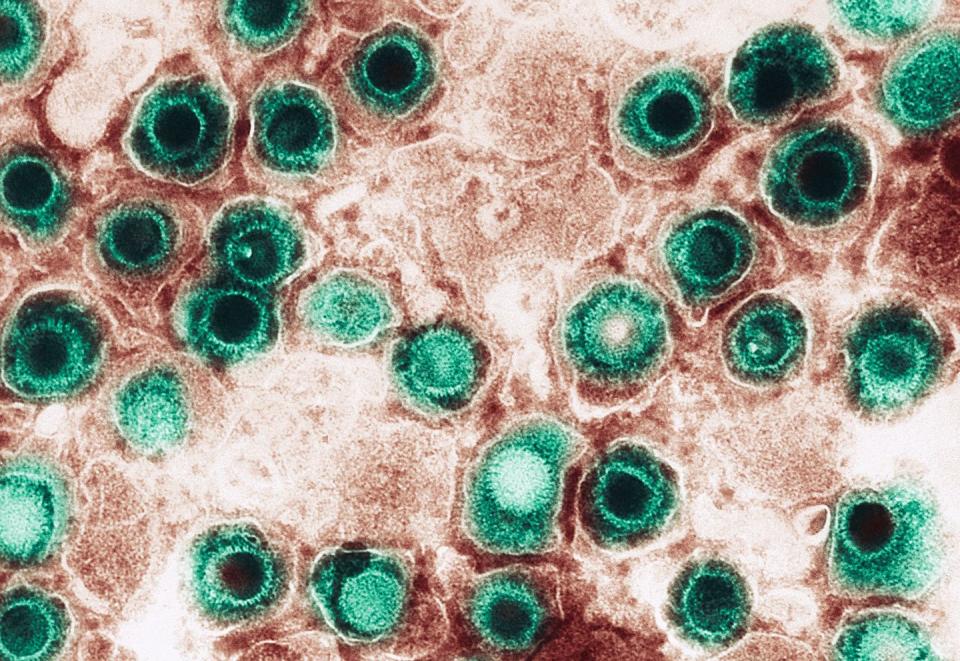How to protect yourself against herpes - plus symptoms to look out for

If you didn’t know, September is Sexual Health Awareness Month. And while it’s not super sexy, it is super important. Because while we may be getting excited for the sexual wellness bargains up for grabs this Black Friday and beyond, if you’re not healthy, toys, trysts and sexy hookups just aren’t as much fun.
Some of the most common sexual health questions professionals are asked are about herpes. What is it? How do you catch it? How do you know if you have it? It’s a largely misunderstood virus, so we’ve done the heavy lifting for you and answered all the big questions.
Herpes is extremely common – according to the World Health Organisation, 67% of people globally have Type-1 Herpes (the oral kind you get around your mouth), while 13% of the world’s population have Type-2 Herpes – the sexually transmitted kind. And yes, there are two kinds.
The reason this humble virus is so common is two-fold. Firstly, herpes is often asymptomatic, meaning lots of people may not notice they have either of the strains. And secondly, unlike bacterial STIs like gonorrhea or chlamydia, Herpes can’t be cured. Luckily though, it can be managed with medication.
What is genital herpes?
As we mentioned, there are two types of herpes; oral herpes and genital herpes. Oral herpes are the type you get around your mouth; aka, cold sores. While oral herpes are not an STI, the sores are contagious and can transmit from mouth to genitals via oral sex. So, you should stay away from kissing or performing oral if you have a cold sore.
Genital herpes, on the other hand, is an STI and is “transmitted through sexual activity be it vaginal, oral, or anal. Genital herpes will cause small blisters on and around the genitals and is most commonly found on the penis, vagina, and anus, and can even be found on the mouth if they are contracted during oral sex” explains Dr Alexis Missick, General Practitioner from UK Meds.

Symptoms of Genital Herpes
Genital herpes can be asymptomatic – meaning there are no symptoms at all – but for most people, you may start to notice symptoms between two and 20 days after transmission, says Dr Missick.
“If and when symptoms do appear, the most common one is genital sores,” explains Dr Missick, “This may begin as a tingling or itching sensation in the genitals, which will then turn into clusters of small blisters around the vulva, vagina, penis, anus or the inside of your thighs. These small blisters are normally red, very painful and filled with liquid (often a yellowish colour). They will then burst open and turn into sores that will eventually scab over and heal.”
Other symptoms to look out for include:
Small red blisters around the genitals
Pain or itching in private areas
Unusual vaginal discharge
Small white bumps around the genitals
Cold and flu like symptoms
Painful urination
If you spot these symptoms, you should contact your doctor and refrain from any sexual activity until you have seen a medical professional. But it’s important to not freak out. All this is treatable and manageable and if not your fault that you’ve been affected by an STI. Like we say, they are incredibly common and they’re not a reflection on you as a person.
“When you notice symptoms of an outbreak for the very first time, it can be worrying and unnerving. The most important thing to remember is that while this outbreak can last 2-4 weeks, it’s always the most severe and subsequent outbreaks won’t be as bad or as long,” she says, adding; “some people never really have further outbreaks and many people only have one or two a year.”
How is genital herpes spread?
Herpes is spread via non-protected sex with someone who already has the virus. This can include vaginal sex, anal sex and oral sex. If someone has oral herpes, this can become genital herpes if spread to the genital region via oral sex. So more than anything, always be self aware, be careful and don’t ever feel pressured to take risks with your sexual health. Barrier methods like condoms and dental dams are your best friend when it comes to preventing these kinds of issues, and if you’re worried that a partner might be contagious, have a chat about disclosure, treatment and where you both stand with regards to your safety.
Dr Missick stresses that “you can still carry and pass on genital herpes without there being any visible signs. Herpes is transmitted through skin-on-skin contact with an infected area whether there are visible blisters there or not,” she adds.
Sexual health professionals are often asked: can you get herpes from kissing? Which is a fair question. Obviously kissing, oral sex and acts like tribbing and frotting can encourage the spread of the virus. But experts are also faced with questions like, can you get Herpes from sharing glasses or cutlery? You can’t contract HSV1 or HSV2 from sharing a drink as it’s a virus spread via direct skin-to-skin contact.
How to treat genital herpes
Unfortunately, unlike some other STIs, Herpes can’t be cured. Once you have contracted Herpes, you will always have it, and will need to be aware that you could spread it to other partners in the future. However, with the right medical care it can be managed and it doesn’t mean you can never have sex again.
Dr Missick explains that “bacterial infections (like the aforementioned chlamydia and gonorrhea) can be cleared using antibiotics, but viral infections don’t respond to this kind of medication. Your body is also incapable of clearing certain viruses, which is why you live with genital herpes forever after contracting it; your body simply can’t get rid of it.”
Even with treatment, the virus will remain in your body and can flare up again, depending on your stress levels, health and other factors. The first outbreak is likely to be the most painful, and can cause a lot of irritation when urinating. “Your first port of call should be to try over-the-counter painkillers such as Ibuprofen or Aspirin, to help to relieve some of the discomfort. In addition to these, you could also try a topical anesthetic cream, like Lidocaine, to numb sensation in the area,” suggests Dr Missick.

During outbreaks, maintaining personal hygiene is vital. “Bathe regularly to avoid any open sores getting infected and try not to touch the sores; if you do then make sure you wash your hands well afterwards. If you find that towel drying after a bath or shower is too painful then you could try drying the area with a hairdryer.” She also recommends opting for loose fitting clothing and underwear, and avoiding synthetic fabrics in favour of cotton.
As well as personal management, there are some antiviral medications that can help, such as Aciclovir and Valtrex. You will need a prescription from your doctor for either of these medications. So do have a chat with your GP or a sexual health professional about this if you feel you need it.
Mitigating the risk of genital herpes
While there is no shame in contracting Genital Herpes – or any STI – it can have an impact on your relationships and overall health, so it is best to mitigate the possibility of contracting it as best you can.
The best way to protect yourself is by practicing safer sex, including using condoms or dental dams during sex, including vaginal, anal, or oral sex. Using condoms on your sex toys if using them with a partner is also good practice and something you should definitely be doing if you’re using toys with multiple partners
“However,” Dr Missick warns, “Herpes can affect any part of the skin in the genital region, which means that condoms don’t guarantee protection from the disease. While it may not be an airtight method of protection against herpes though, using condoms does significantly reduce the spread of the infection.”
Open and honest communications with sexual partners is also key. “You should always first discuss your sexual health (and theirs) with any potential new partners before having sex with them, to identify how safe each of you are being,” says Dr Missicks.
“It is okay to have sex if you have genital herpes between outbreaks; not when you have active sores. However, you could still pass the infection on and so it’s important that your partner knows, understands and accepts the risks.”
Always put your health first and remember that your worth isn’t dictated by whether or not you’ve contracted a virus. Be respectful of your partners and carry condoms with you, If you’re concerned about symptoms or not sure whether a sore or bump might be Herpes – also known as HSV 1 and HSV 2 – chat to a sexual health professional or book an STI test for peace of mind.
You Might Also Like

 Yahoo Lifestyle
Yahoo Lifestyle 
